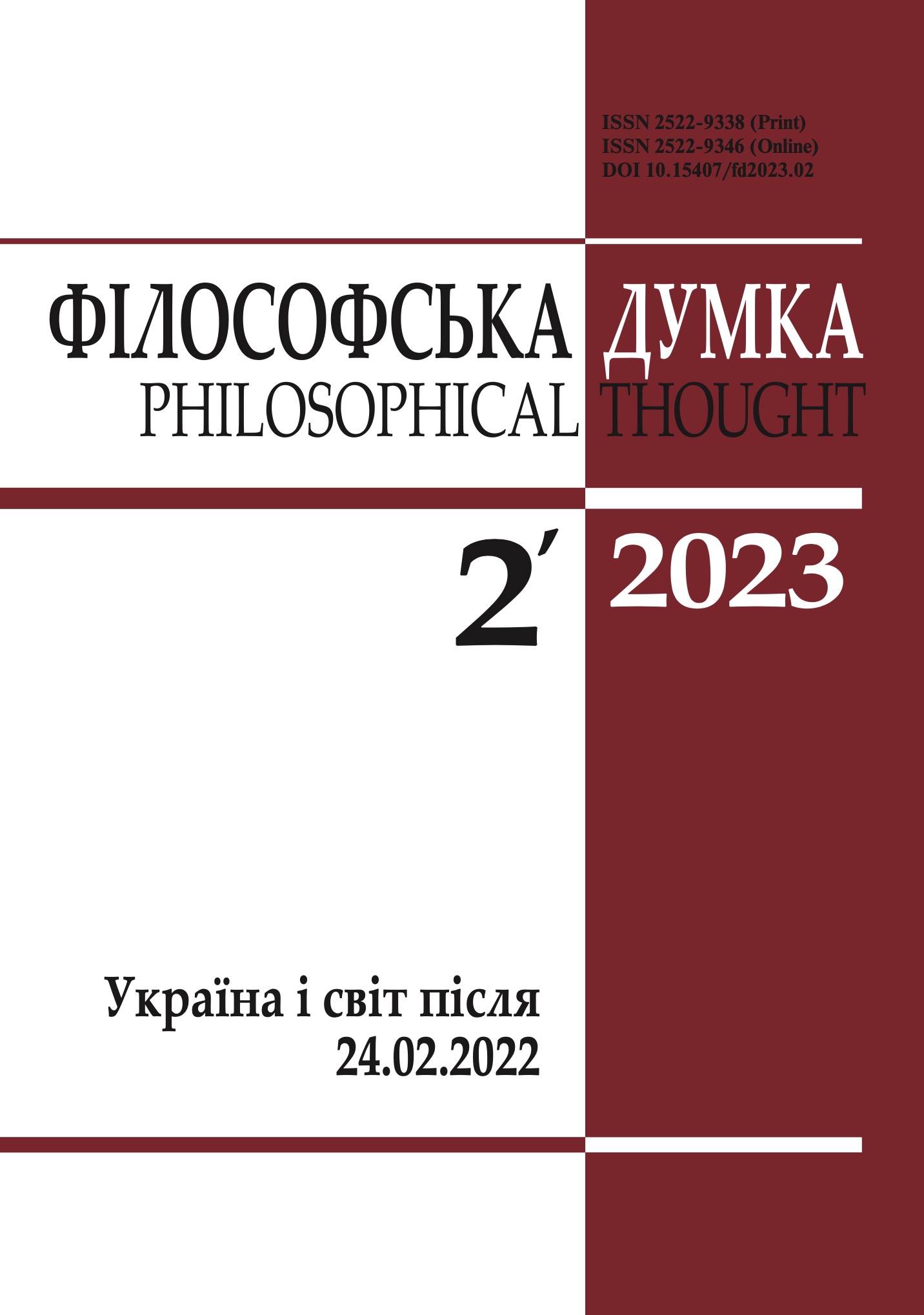HRYHORII SKOVORODA: SYNCRETISM-CORDOCENTRISM-WISDOM
CONTINUATION OF THE TOPIC The philosophy of Hryhorii Skovoroda: History and modernity
DOI:
https://doi.org/10.15407/fd2023.02.144Keywords:
Skovoroda, syncretism, universalism, wholeness, cordocentrism, rational philosophy, EnlightenmentAbstract
The article defends the thesis that Skovoroda is a representative of syncretic culture and thinking, which combines philosophy, religion (faith), poetry (literature), theology into an unity. His universality, as a talented and comprehensively developed personality, also lies in this combining different sphere of a human activity. To combine all this, Skovoroda must be the bearer of syncretic thinking and perception of the world. But, such combination includes also philosophy and, therefore, subordinates it to spirituality. Skovoroda is a sage, who imparts wisdom and sets an example of a morally clean life and strong faith.
The works of Skovoroda should be viewed from the standpoint of syncretism. He did not create a new philosophy for Ukrainian culture, as did, for example, Socrates for Ancient Greek culture, Descartes for French culture, and Kant for German culture. To consider Skovoroda only a philosopher means to reduce him to a «highly specialized mental worker». It is necessary to read Skovoroda's works universally and syncretically, not philosophically (analytically and critically).
The article examines also the weak and strong aspects of the syncretic creativity of Skovoroda for Ukrainian culture in general and Ukrainian philosophy in particular. In Skovoroda's works, there is no analysis and criticism of philosophical problems, there is no consistent rational-logical (step-by-step) construction of a philosophical conception, which he would defend with arguments. Instead, we find in Skovoroda's works many biblical quotations and their interpretation, that is, he uses the Bible to confirm his position and way of life. The authority of the Bible for Skovoroda is indisputable, so it is a source of wisdom for him.
The author argues that Skovoroda is «internally new» for Ukrainian culture. He brings into Ukrainian culture Christianity, which differs from the traditional church, biblical symbolic hermeneutics and vegetarianism as a way of life. Skovoroda's life represents a life of integrated personality.
References
Artiukh, V. (2022). National Images of Hryhorii Skovoroda. [In Ukrainian]. Philosophical Thought, 4, 91-104.
https://doi.org/10.15407/fd2022.04.091
Bartolini, M. G. (2017). «Know Thyself»: Neoplatonic Sources in the Works of H. S. Skovoroda. [In Ukrainian]. Kyiv: Arademperiodyka.
https://doi.org/10.15407/akademperiodyka.331.160
Chyzhevskyi, Dm. (1934). Philosophy of H. S. Skovoroda. [In Ukrainian]. Warsaw: Shevchenko Scientific Society in Lviv.
Confucius. (2022). Analects. [In Ukrainian]. Kyiv: Arii.
Hnatiuk, Ya. (2010). Ukrainian Cordocentrism in the Conflict of Mythologies and Interpretations. [In Ukrainian]. Ivano-Frankivsk: Symfonia forte. Kuznetsov, V. (2014). Enlightement and Ontology. Autochthonous Enlightements: China. [In Russian]. Sententiae, XXX(1), 129-146.
https://doi.org/10.22240/sent30.01.129
Liutyi, T. (2022). Skovoroda. Composure. [In Ukrainian]. Kyiv: Tempora. Lodii, P. (1815). Logical Guidelines for Knowing and Distinguishing True from False. [In Russian]. Saint-Petersburg: Printed in Typography of I. Ioanessov. Moiseiv, I. (2002). Cordocentrism. In: Philosophical Encyclopedic Dictionary, Ed. by V. I. Shynkaruk (p. 303). Kyiv: Abris.
Pietsch, R. (2021). Hryhoriy Skovoroda and His Mystical and Metaphysical Knowledge in the Context of European Spiritual History (Brief Review). [In Ukrainian]. In: Philosophical Thought of Ukraine in the 11th-18th Centuries: From Patristics to Scholasticism (pp. 417-452). Kyiv: Institute of Philosophy.
Pietsch, R. (2022). Study of the Heritage of Hryhorii Skovoroda in Germany. A Brief Overview. [In Ukrainian]. Philosophical Thought, 4, 54-65.
https://doi.org/10.15407/fd2022.04.054
Pilipowicz, D. (2022). Oeuvre of Hryhorii Skovoroda in Polish Scientific Thought. [In Ukrainian]. Philosopophical Thought, 4, 66-90.
https://doi.org/10.15407/fd2022.04.066
Plato. (1999). Apology of Socrates. [In Ukrainian]. In: Plato, Dialogues (pp.20-41). Kyiv: Osnovy.
Plato. (2000). Republic. [In Ukrainian]. Kyiv: Osnovy.
Skovoroda, H. (1973). A Conversation Called the Alphabet, Or the ABC Book of the World. [In Ukrainian]. In: H. Skovoroda, Complete Collection of Works in Two Volumes: Volume 1 (pp. 411-463). Kyiv: Naukova Dumka.
Symchych, M. (2009). Philosophia rationalis at the Kyiv-Mohyla Academy. Comparative analysis of Mogilian logic courses of the end of the 17th - the first half of the 18th century. [In Ukrainian]. Vinnytsia: O. Vlasluk.
Yarmus', S. (1983). Spirituality of the Ukrainian People. [In Ukrainian]. Winnipeg: Nakladom Tovarystwa "Volyn".
Yarmus', S. (1989). Cordocentrism as the Basis of Ukrainian Spirituality and Philosophy. [In Ukrainian]. In: Proceedings of the Jubilee Congress (pp. 402-415). Munich: Ukrainian Free University.
Yermolenko, A. (2022). The Practical Philosophy of Hryhorii Skovoroda in the Light of Our Experience. [In Ukrainian]. Philosophical Thought, 4,. 7-26. Yosypenko, S. (2022). Skovoroda, Kovalynskyi and Mingard. [In Ukrainian]. Philosophical Thought, 4, 27-53.
Downloads
-
PDF (Українська)
Downloads: 298
Published
How to Cite
Issue
Section
License
Authors who publish with this journal agree to the following terms:
- Authors retain copyright and grant the journal right of first publication.
- Authors are able to enter into separate, additional contractual arrangements for the non-exclusive distribution of the journal's published version of the work (e.g., post it to an institutional repository or publish it in a book), with an acknowledgement of its initial publication in this journal.
- Authors are permitted and encouraged to post their work online (e.g., in institutional repositories or on their website) prior to and during the submission process, as it can lead to productive exchanges, as well as earlier and greater citation of published work (See The Effect of Open Access).


